What's on in Parliament?
- Published
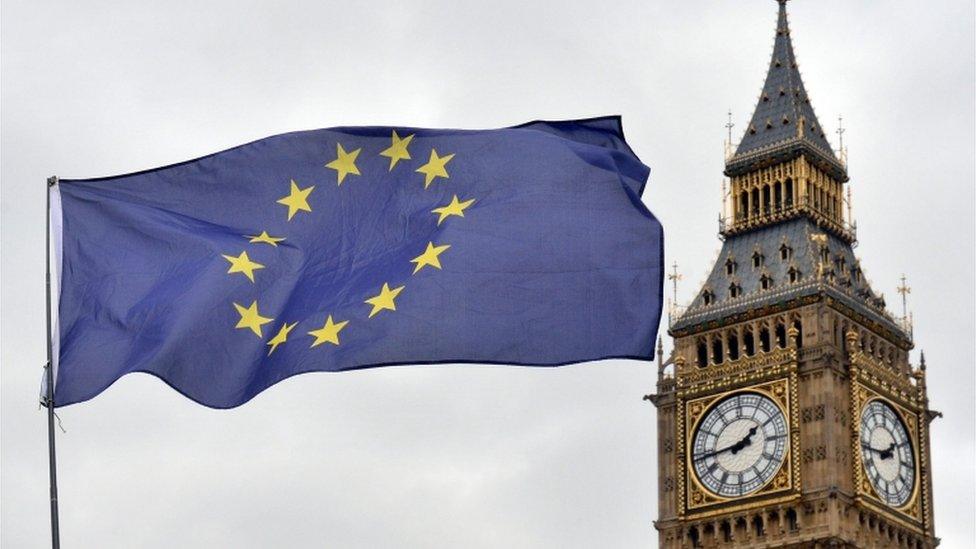
The calm before the storm over the EU (Withdrawal) Bill?
Is this the last calm week in Parliament before the storm of Brexit legislation is unleashed on MPs?
On the face of it, this will be a week of relatively light legislating, with the major points of interest coming from statements and urgent questions, or high-profile committee hearings.
But beware of the undercurrents.
The government will face a succession of difficult votes when it brings the Lords amendments to the EU (Withdrawal) Bill before MPs.
These are very high-stakes votes, and government hopes of striking those amendments down seem to rest on a handful of Brexiteer Labour MPs either voting with ministers or abstaining, and thus countering the soft Brexiteer/Remainer MPs on the Tory benches.
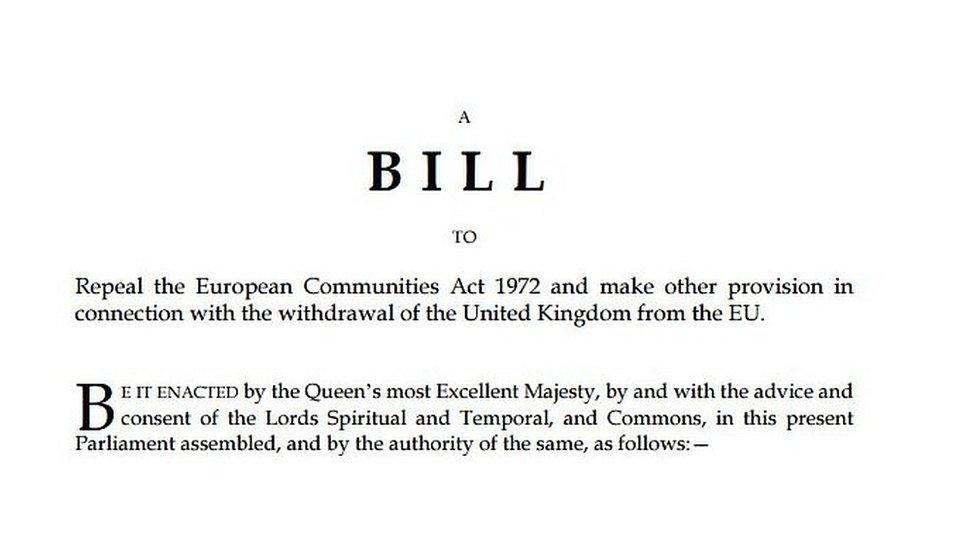
So both potential Labour and Conservative rebels will doubtless come under extreme pressure to toe their respective party lines - and it is possible that a few yelps of pain may be audible in the Chamber or even outside it.
Elsewhere, keep an eye on Thursday's Westminster Hall debate - effectively on Heathrow expansion. This is a very difficult issue for a number of London MPs (remember Zac Goldsmith resigning his seat and losing the ensuing by-election?) and this debate may amount to a dress rehearsal for a Commons vote on the issue, promised before the summer recess.
Here's my rundown of the week ahead:
Monday
The Commons reconvenes (2.30 pm) for Home Office questions, after which the usual crop of post-recess urgent questions and ministerial statements can be expected.
One likely subject may well be the government's attitude towards legalising abortion in Northern Ireland, in the wake of the referendum verdict in the Republic.
And watch out for the Transport Committee chair, Lillian Greenwood, raising what she described as the "ongoing timetabling chaos" on the railways.
The day's main legislation is Second Reading of the Ivory Bill - which will ban the commercial use of ivory in the UK - bringing in a total ban, with narrow and limited exemptions, on commercial activities involving ivory in the UK which could directly or indirectly fuel the poaching of elephants.
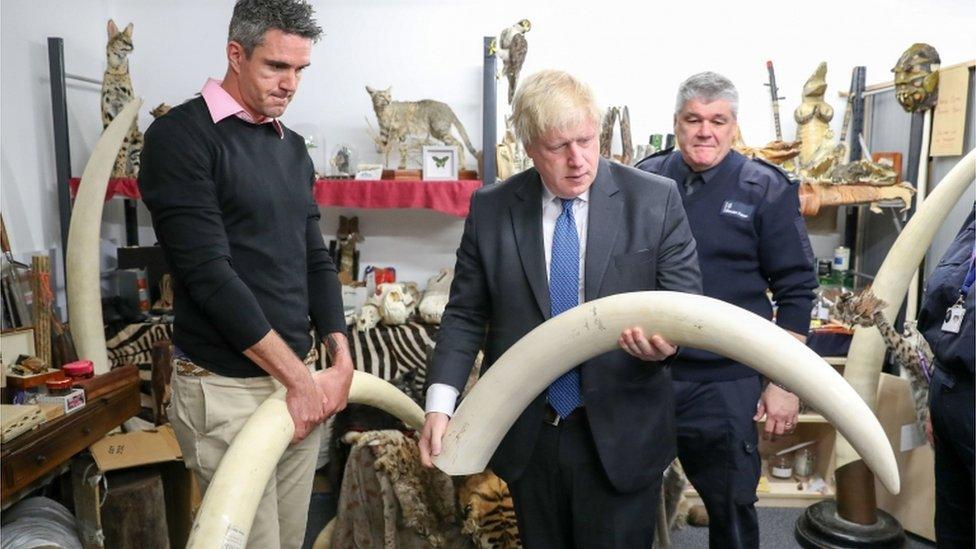
Boris Johnson inspected some illegal ivory seized at Heathrow in May
The aim is to help prevent elephant poaching by closing the UK ivory market to all items containing ivory, except those that meet the narrow exemptions - covering some pre-1975 musical instruments and items that the secretary of state deems to be of "outstandingly high artistic, cultural or historical value".
The thinking is that legal ivory markets, including for "antique" ivory, send mixed messages to consumers and contribute to maintaining demand for ivory as a desirable product - and a ban will make ownership of ivory less socially acceptable and encourage consumers to think about the origins of their purchase. It would also reduce the opportunity for new ivory to be laundered through legal markets. The Bill will not affect the ownership, inheriting, donating or bequeathing of ivory items.
The adjournment debate is on geothermal energy in Clackmannanshire. Local MP Luke Graham wants a plan to use former mine shafts to harness the natural heat from warm water underground, to generate clean energy to be included in the city deal currently being negotiated for Clackmannanshire and Stirling.
In Westminster Hall (4.30 pm), MPs debate e-petition 200888, a call to ban the sale of animal fur in the UK, which attracted 109,554 signatures.
The petition argues that although fur farming was banned in England and Wales in 2000, and in Scotland in 2002, fur products can still be legally imported from other countries and sold here in the UK.
Supporters of a ban say that since that time, Britain has imported animal fur worth more than £650m from countries like Italy, France, Poland, China and Russia, where animals are reared in appalling conditions on fur farms. Although these debates do not lead directly to a change in the law, this could be the launch pad for an attempt to legislate.
My committee pick is the public accounts hearing on staff shortages in the armed forces with Stephen Lovegrove, permanent secretary, Lt Gen Richard Nugee, chief of defence people, and AVM Richard Knighton, assistant chief of defence staff (Capability and Force Design), Ministry of Defence.
In the Lords (2.30 pm) questions to ministers include the former commissioner of the Metropolitan Police, Lord Hogan-Howe, asking about the outcome of the review of police officers' use of firearms, and the former deputy speaker of the Commons, Lord Naseby, asking about possible government plans to ban the sale of new diesel, petrol, hybrid, and electric, cars over the next 25 years.
The day's main debate is on the second reading of the Rating (Property in Common Occupation) and Council Tax (Empty Dwellings) Bill - the main interest in this measure is its proposal to allow a higher council tax to be levied on empty homes, and a modest speakers list suggests that this will be a fairly brief encounter.
It will be followed by a short debate commemorating the contribution made by Empire and Commonwealth troops during WW1 - led by the Conservative historian, Lord Lexden.
Tuesday
MPs open, (11.30 am) with Justice questions - and after an hour, there may well be a second helping of post recess UQs and government statements.
Next comes a Ten Minute Rule Bill from the Scottish Conservative David Duguid to require the Health Secretary to conduct a review into 22q11.2 Deletion Syndrome - sometimes called DiGeorge Syndrome - which can cause congenital heart problems, frequent infections, developmental delays and learning problems. It would then require the NHS to publish a strategy to deal with the condition.
The day's first debate is on the Second Reading of the Non-Domestic Rating (Nursery Grounds) Bill - which aims to deal with an Appeal Court ruling that removed the long-standing rates exemption for buildings in plant nurseries. Since that ruling in March 2017, the Government has been committed to restoring the long-standing position, and this Bill will do so with retrospective effect, from 1 April 2015.
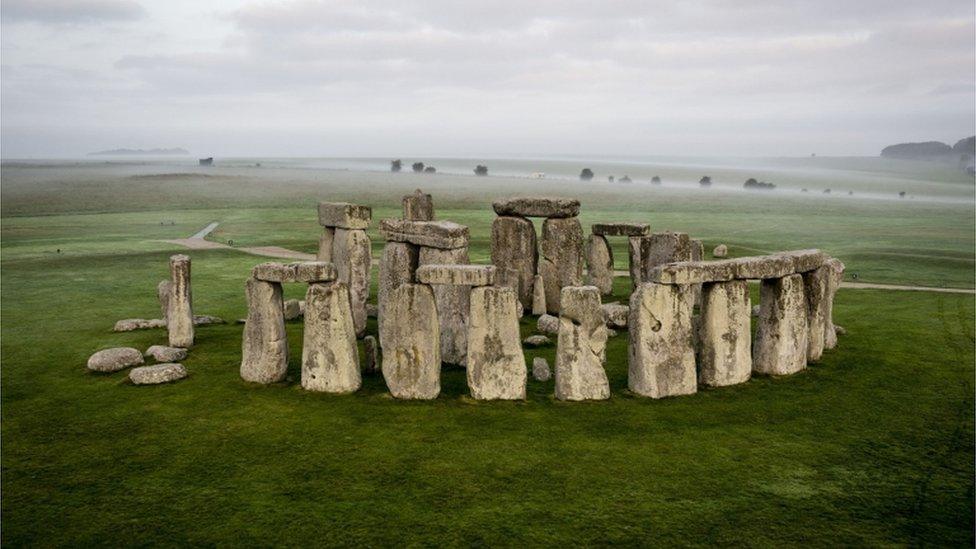
MPs will debate plans for a tunnel near Stonehenge
Then comes a general debate on Nato, which may well provide a vehicle for concerns about Russia and the strength of the UK's armed forces - and about President Trump's attitude towards the alliance.
In Westminster Hall, the day opens with a debate (9.30 am) on a controversial new Polish law - passed in March, that outlawed any reference to Polish complicity or involvement in the Final Solution during the Second World War. And the Labour MP Alex Sobel wants the UK government to condemn what he says are "repressive laws" which amount to "a deeply concerning and dangerous attempt to re-write history."
Other subjects for debate include potholes and road maintenance (11 am); Public sector pay policy (a call to the government to scrap the 1% public sector pay cap and fund above-inflation pay rises, from the SNP MP, Chris Stephens, who chairs PCS parliamentary group -2.30- 4 pm); the conflict in South Sudan (4 pm) and then, proposed road alterations around Stonehenge (4.30-5pm).
This is being led by the Conservative former history teacher, Alex Burghart, who is seeking reassurance that everything is being done to identify and protect the "extraordinarily precious" archaeological environment in the World Heritage Site at Stonehenge, as the government considers improvements to the A303.
On the Committee Corridor, look out for Justice committee hearing (10 am) on the disclosure of evidence in criminal cases. The main witness is Director of Public Prosecutions Alison Saunders.
In the Lords (2.30 pm) the main debate is Report Stage consideration of the Automated and Electric Vehicles Bill - this deals with the legal framework for self-drive vehicles and promoting electric vehicles, including measures to regulate the provision of public charging points.
Labour also has a regret motion against the Electronic Communications (Universal Service) (Broadband) Order 2018. This sets out the extent to which broadband connections and services must be provided and specifies minimum download speeds of 10Mbps - seen as the minimum level of broadband performance required for a typical household for web browsing, email and video services.
Wednesday
The Commons opens (11.30 am) with questions (watch out for sparring about a second independence referendum) followed by Prime Minister's Question Time at Noon.
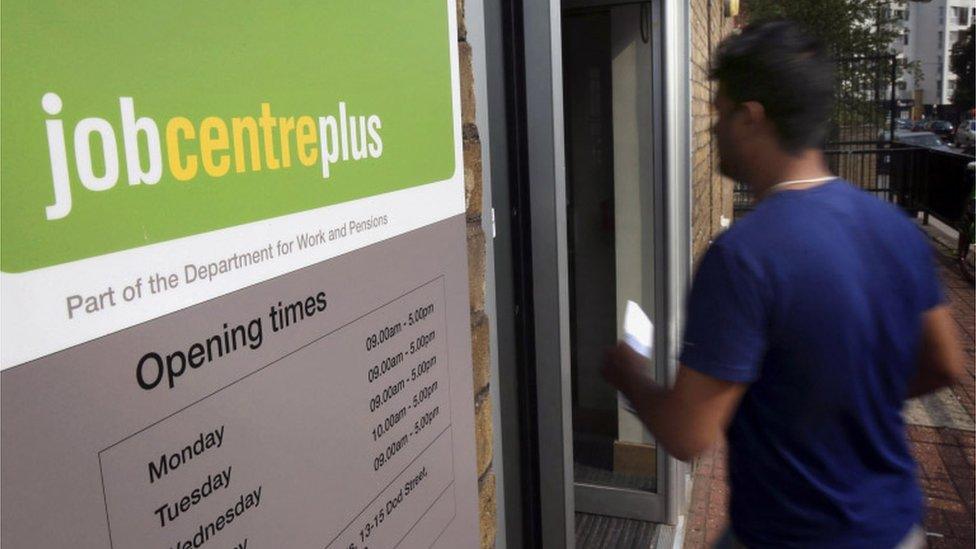
Employment rates will be among topics for debate in Westminster Hall
The day's Ten Minute Rule Bill from the Labour MP Lloyd Russell-Moyle, aims to require the government to provide youth services - this is something being pushed for by an All-Party Parliamentary Group which argues that it would help prevent youth crime. The group is planning to hold hearings on the state of youth services, next month.
The main debate will be on a Labour motion (or, more probably, two shorter debates on two Labour motions) yet to be announced. And the day ends with an adjournment debate on transport safety for blind and visually impaired people led by Labour MP Liz Twist.
In Westminster Hall, the subjects for debate include recent trends in employment rates (9.30 - 11 am) with the Conservative MP Michael Tomlinson seeking to highlight increases in both the number and the proportion of people in employment. The employment rate was 75.4% in December 2017 - February 2018, the highest rate since records began in 1971.
Next, (11 am) Plymouth Labour MP Luke Pollard continues his campaign to get the new Type 26 frigates based in his home city - following cuts to other armed forces in Plymouth. I wonder if this will see a new instalment in his continuing rivalry with his Conservative neighbour, Jonny Mercer.
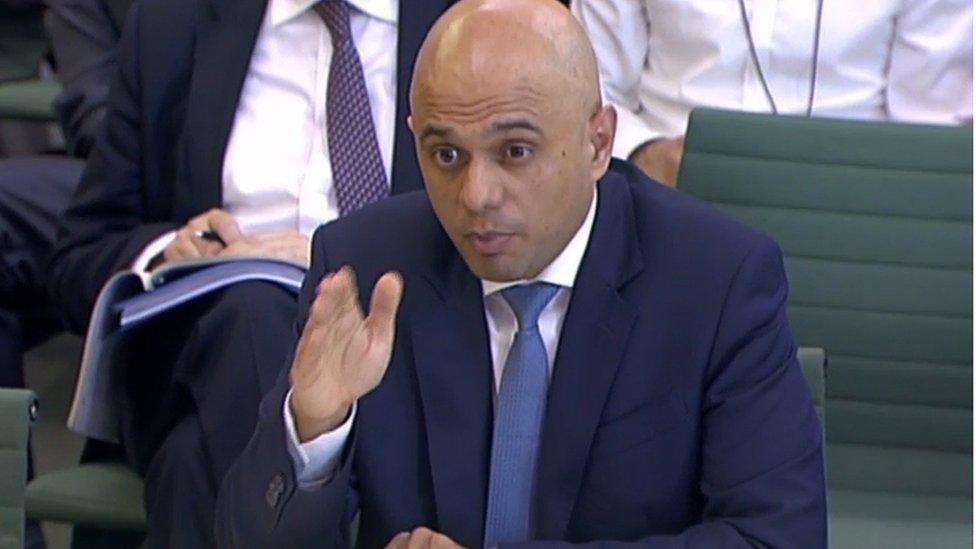
The new home secretary will be back before MPs over the Windrush scandal
In the afternoon, Labour MP Sir David Crausby leads a debate on Northern Rail services in Greater Manchester (2.30 pm). He has backed calls for an investigation into Northern's failures and for the government to consider stripping Arriva (the umbrella body), of the Northern Rail franchise, to bring the service back into public ownership.
At 4pm, Conservative Philip Hollobone leads a debate on Hizbollah's rocket arsenal in southern Lebanon, and finally Labour MP Ellie Reeves has a debate (4.30- 5.30 pm) on Voter ID pilot schemes. At the local elections this year, her Lewisham West constituency was part of a trial to require voter ID, to help reduce electoral fraud. She will argue that the problem is exaggerated and that the proposals trialled in Lewisham and elsewhere were found to be far too draconian and would disenfranchise voters.
There is plenty of interesting action on the Committee Corridor, look out for the Treasury select committee session on the service disruption at TSB (2.30pm) and the former Cambridge Analytica boss Alexander Nix in front of the DCMS committee on Fake News - where he was recalled because the committee was concerned that answers he gave at a previous appearance before it were not consistent with other information they had received.
And the new home secretary, Sajid Javid, will appear before the Joint Committee on Human Rights to discuss the Windrush scandal. (3.15 pm)
In the Lords (3 pm) peers will debate Commons amendments to the Nuclear Safeguards Bill. Back in March, the ministers were defeated when the Lords voted to add a clause to require the government to suspend the UK's withdrawal from the atomic energy cooperation agency, Euratom, until either international agreements have been reached or the UK is allowed to continue under current arrangements. Labour plan to enjoy themselves by pointing to what they say amounts to government acceptance of that amendment.
The main debates are on two European Union Committee reports: Brexit: the future of financial regulation and supervision, external' and Brexit: energy security, external.
Thursday
The Commons opens (9.30 am) with Environment, Food and Rural Affairs questions, followed by mini-question times to the MPs who speak for the Church Commissioners, the House of Commons Commission, the Public Accounts Commission and the Speaker's Committee on the Electoral Commission.
Then comes the eagerly awaited Business Statement from the Leader of the House, Andrea Leadsom.
It is eagerly awaited because she is expected to announce the date for the consideration of the many Lords amendments to the EU (Withdrawal) Bill. The government may not have the votes to strike down a series of changes which could undercut Theresa May's approach to Brexit.
She might also announce the date for the Report Stage consideration of the Trade Bill, which suffers from similar problems. Eyebrows will head skywards if those dates are not forthcoming.
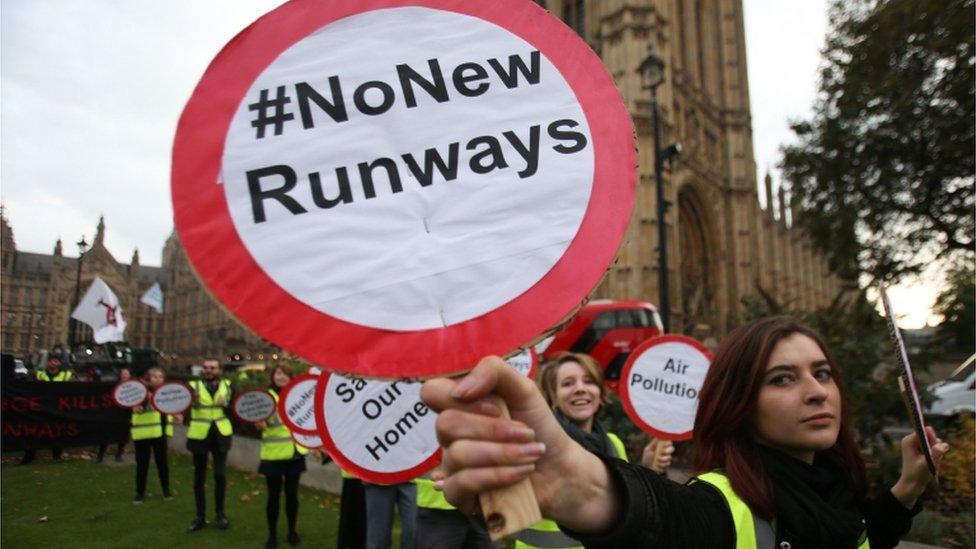
Airport expansion is a political hot potato
A short select committee statement follows, from the SNP's Pete Wishart, in his role as chair of the Scottish Affairs Committee, on the publication of their report into RBS branch closures.
Then come two backbench business committee debates - first on ending tuberculosis.
The motion from the Conservative, Nick Herbert, and Labour's Virendra Sharma notes that TB is the world's deadliest infectious disease, killing 1.7m people a year.
It calls on the government to boost research into new drugs, diagnostics and vaccines and press other countries to act, at a forthcoming UN summit.
Second is a motion on early elections, human rights and the political situation in Turkey from Labour's Joan Ryan.
In Westminster Hall (1.30 pm) there's a debate on the Transport Committee's report on the Airports National Policy Statement . The NPS is a political hot potato because it calls for a new runway at London's Heathrow Airport. This is a highly significant report which, very guardedly, backed plans for Heathrow expansion, at least to the extent of allowing the planning process to move to the next stage, by approving the Airports National Policy Statement.
But the report also calls for stringent conditions on air quality and other environmental issues. So this debate would be an appetiser for a full Commons debate on the NPS.
In the Lords (11.00 am) there's an interesting-looking question from former MEP Lord Kirkhope of Harrogate on term extensions for UK members of the European Parliament - Brexit delayed?
And the main debates are on the situation in the Palestinian Territories - led by the former Liberal leader, Lord Steel of Aikwood, and the report of the chief inspector of borders and immigration: An Inspection of the Vulnerable Persons Resettlement.
Neither House sits on Friday.